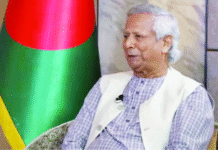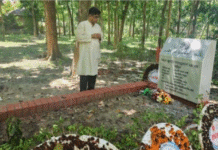Bangladesh’s Supreme Court judge Surendra Kumar Sinha has sought Indian judicial training for judges in his country, says the ‘Times of India’.
The paper quoted Sinha, now on a visit to Delhi, as saying that he was impressed by the rigor of judicial training imparted in India’s state judicial academies and the national judicial academy.
Sinha asked Altamas Kabir, Chief Justice of India’s Supreme Court, for help in training judges from Bangladesh.
He is leading a 5-member Bangladesh delegation to India now.

Kabir said it was possible to train Bangladesh judges in India provided the two governments worked out an agreement.
“On principle, we agree to train judges from Bangladesh. There should be no problem with that,” Kabir was quoted as saying.
Justice Sinha was also impressed by the complete computerisation of judicial records in India and said this should happen in Bangladesh as well.
“Sooner the better.”
Bangladesh’s judiciary is quota-riddled with positions reserved from children of former judges, women, tribals and children of freedom fighters and many believe this affects quality.
Source: Bd news24










The judiciary in Bangladesh lacks not only trained people but also people with good stock and strong spine. We keenly observe in every courtroom, and also outside the Supreme Court premises, a blindfolded lady holding a balance the scales of which are accurately at a level. There are also ‘ayats’ (verses) from the holy Qur’an, written on the court walls, about the status of the judges and what they have been ordained to do; but do our judges follow that? Training may increase skill but not the morality and conscience, the things most needed in Bangladesh judiciary. A bitter fact is on whatever and however strong and powerful seat one may be set, a spineless ‘sitter’ cannot deliver anything good. Haven’t our hon’ble judges read about the Quazi during Sultan Ghiasuddin Bulban’s rule? He who, while sitting on the seat of justice, think for a moment that there is the supreme JUDGE who must be reckoning with what he’s doing can never set his feet outside the boundary of ethics and morality. Besides, remember Tagore’s writing: That judgement is the best in which both the punished and the punisher weep being equally hurt. (Danditer sathe, Dandaadata kande jobe soman aghate, Sarbosreshtha she bichar.)
What a shame. Now we have to learn from the Hindu justice system. With the power she has, Hasina can easily declare Bangladesh, her father’s Zamindari, a part of West Bengal (India) and that sould solve all problems once and for all. Dadas and Didis, don’t worry, soon you will have all the Hilsas that you can eat – all yours.
Training should be given to those who appoint the judges in the first place. If party and/or personal loyalty is given priority before merit, then it would be useless to train judges in India or elsewhere.